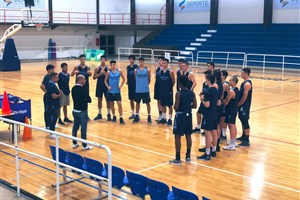
St. Vincent and the Grenadines, creating good citizens with sports
KINGSTOWN (St. Vincent) - It's not just about basketball for the St. Vincent and the Grenadines Basketball Federation, but also about developing all their players’ social character, and guiding them toward an active and healthy live. With this route in mind, they've created an initiative titled Mini Basketball Coaches Caravan, providing workshops and free activities to boys and girls from the age of 5 to 11, and whose priority is fun.
The project has been in course for several months and will continue throughout the summer, when the Federation expects to celebrate a global encounter with all participants, and eventually a Mini Basketball tournament. Among those that have participated are professional player Sancho Lyttle, who was born in St. Vincent and the Grenadines and has WNBA and EuroLeague experience.
“In the FIBA General Assembly, the new Secretary General [Andreas Zagklis] stated that they wanted basketball to eventually be the number one sport in the world and try to have every young person holding at least one ball,” explained the Federation’s President, Wayne Williams, to FIBA.basketball. “We've adopted this philosophy. We've embraced the Secretary General’s call.”
Williams pointed out that there's a competition between basketball and other more popular sports in the island, and that there’s a need to create new ways of attracting the youth to the game.
“Another issue we've come to realize is the increase in activities by other sports organizations. For example, football and the tremendous amount of resources they receive. We're competing for the same talent, so we must also be present in formative categories, particularly with the younger children. We're trying to bring sports to them as early as possible,” the leader sustained.
The lack of infrastructure is one of the great challenges that the Federation faces. Because there are no recreational facilities with a ceiling, we need more backboards and rims, because they're essential for the organization to stay actives in areas were futsal has occupied basketball courts.
“The fact that we don't have a greater presence in the country's courts (is an issue),” said Williams. “We started the programs, but eventually we encountered problems (to install) the systems. When we go somewhere, our impact is limited for the lack of infrastructure. Of course, when we leave an area, we wish children to continue to play basketball. So, we must increase the number of balls and rims in the program so that we can leave them (permanently) in the community.”
The President also shared his intention of identifying staff they can train in each one of the caravan’s stops so that they may continue the program by themselves. Williams hopes that these individuals may begin their education through the on-line tools provided by FIBA and eventually achieve the certification granted by the world basketball's governing entity.
Acknowledging these hurdles, Williams and his staff have decided to focus more on the social aspects of their Federation’s work. The development of good players that may represent the nation continues to be important, but, the social component is also a parallel priority that they have decided to call “Creating citizens through sports.”
“We've adopted the Long-Term Athletic Development Program that our National Olympic Committee promotes,” said Williams. “Not only have we focused on elite athletes, but also in the person's complete development. Not all athletes will become elite, but we want them to stay active throughout their lives. The long-term development program allows for that to happen.”
FIBA
















